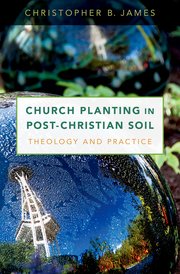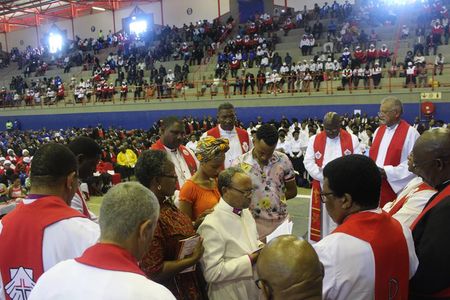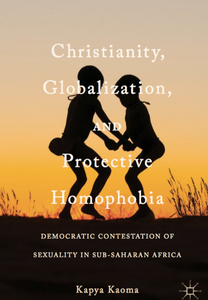News of the extended network of faculty, alumni, students, visiting researchers, and mission partners is regularly updated, and some of the big ideas or major events in Global Christianity are covered in the CGCM News.
Church Planting in Post-Christian Soil
 Christopher James, BUSTH alumnus, was awarded the Gold Medal in Theology for his book Church Planting in Post-Christian Soil by the Illumination Book Awards. Book Description: "Christopher James attends carefully to stories of ecclesial innovation taking place in Seattle, Washington-a city on the leading edge of trends shaping the nation as a whole. James's study of the new churches founded in this "post-Christian" city offers both theological reflection and pragmatic advice."
Christopher James, BUSTH alumnus, was awarded the Gold Medal in Theology for his book Church Planting in Post-Christian Soil by the Illumination Book Awards. Book Description: "Christopher James attends carefully to stories of ecclesial innovation taking place in Seattle, Washington-a city on the leading edge of trends shaping the nation as a whole. James's study of the new churches founded in this "post-Christian" city offers both theological reflection and pragmatic advice."
Mission and the Methodist Connexion in Southern Africa
 The Methodist Church of Southern Africa installed the leader of its Mission unit, Rev. Dr. Kenaleone Ketshabile ('12), as the new bishop of the Kimberly, Namibia, and Bloemfontein District. The District is mostly rural and rich in many languages including Afrikaans, English, Sesotho, Setswana, etc. Its vision and mission is aligned with the Connexional one – that Methodist people are called to proclaim the gospel of healing and transformation.
The Methodist Church of Southern Africa installed the leader of its Mission unit, Rev. Dr. Kenaleone Ketshabile ('12), as the new bishop of the Kimberly, Namibia, and Bloemfontein District. The District is mostly rural and rich in many languages including Afrikaans, English, Sesotho, Setswana, etc. Its vision and mission is aligned with the Connexional one – that Methodist people are called to proclaim the gospel of healing and transformation.
Call for Papers: Chinese Christianities
- The relationship between various Chinese Christian groups (e.g., house church vs. TSPM, underground vs. CCPA, Catholic vs. Protestant).
- The rejection and resurgence of denominational/confessional identities (e.g., the local church, the post-denominational era, cultural Christians, Chinese American churches).
- Church unions and schisms, ecumenism and independency (e.g., Church of Christ in China, Lausanne/WCC, Sino-Vatican relations).
- Transnational and transregional networks (e.g., Cantonese or Wenzhou networks, house church networks).
I am happy to field any informal enquiries about the Chinese Christianities Seminar. Otherwise, please submit proposals through the online system.
—
Dr Alexander Chow
Lecturer in Theology and World Christianity
School of Divinity, University of Edinburgh
New College, Mound Place
Edinburgh EH1 2LX
Challenges and Prospects: Christianity in India
The Orthodox Christian Network, a media ministry associated with the Assembly of Canonical Orthodox Bishops of the United States of America, recently interviewed Jesudas Athyal regarding the growth and health of Indian Christianity as well asa closer look at the religious situation in India today. The conversation can be listened to online.
Call for Papers: Medical Missions and Health
Call for Papers Journal of Social History of Medicine and Health Special Issue on Medical Missions and Health
The term “Medical Missions” is most strongly associated with nineteenth and twentieth century Christian missionaries from Europe and the United States traveling to countries in Asia, Africa, or Latin America and practicing medicine, providing education leading to careers in medicine (physicians, nurses, midwives, pharmacists, etc.) and, especially as the twentieth century progressed, conducting work in public health. Both at the time and later, supporters of missions cited medical missions as tangible evidence of the value of missionary work, and even those critical of missionary endeavors more broadly frequently praised medical missionaries. Scholars have also explored how medical missionaries have contributed to “modernization.” From the 1980s onward, however, scholars have explored connections between medical missions and imperialism. This is connected to broader scholarship on the links between the spread of medical techniques and education associated with “scientific medicine” and imperialist ideologies, and can be found in scholarship on “missionaries of science” such as people associated with the Rockefeller Foundation as well as missionaries dedicated to the propagation of specific religious ideologies. At the same time, scholarship on how local actors interpreted and adapted missionary medical programs challenged a simple model of medical imperialism. Scholarship on medical missions has extended into the twenty-first century, studying medical missions amid growing globalization and new medical challenges.
This special issue seeks essays that contend with these issues pertaining to the study of medical missions, broadly conceived, from any time period and in any location. The definition of “medical missions” is deliberately flexible. If scholar can make a case that their topic fits into the category of “medical missions” the article will be considered. To ensure consideration papers must be submitted by March 28, 2018 to shemoca@plattsburgh.edu . Earlier inquiries are welcome. Essays should be between 7500 and 9500 words.
The language of the journal is Chinese, but English language submissions are welcome and will be translated into Chinese.
Sexual Politics and Christianity in Africa
 In his most recent book, Christianity, Globalization, and Protective Homophobia, Visiting Researcher Kapya Kaoma illuminates the complex and contested nature of sexual politics in sub-Saharan Africa. He examines the way competing understandings of sexuality collide and intermingle, and seeks a way beyond the impasse.
In his most recent book, Christianity, Globalization, and Protective Homophobia, Visiting Researcher Kapya Kaoma illuminates the complex and contested nature of sexual politics in sub-Saharan Africa. He examines the way competing understandings of sexuality collide and intermingle, and seeks a way beyond the impasse.
Missionary Projects and Indigenous Responses in the Asia Pacific
The past decade has witnessed a remarkable resurgence of historical and anthropological interest in the reasons, practices, moralities and effects of indigenous conversion to Christianity. Rejecting conceptualizations of conversion that would restrict it a priori to a clearly demarcated ‘religious’ space, recent scholarship on conversion has highlighted the entanglements between Christian mission and modernity, imperial networks and/or state projects of nation-building. While some investigations into conversion have perceived it as a great rupture with the past, others have argued that a focus on apparent breaks with the past tends to conceal the ways in which earlier identities and beliefs were perpetuated and extended through Christian affiliation. Questions have also been asked about the forms of Christianity that were active in these mission encounters; as well as the varieties of Christianity that scholars today are inclined to foreground, or ignore. At stake in all these debates are crucial questions about the nature of the Christianity that was promulgated—and that which was embraced by converts themselves.
In this panel we seek to further advance scholarship on conversion to Christianity by critically examining the interactions between missionaries and converts within particular contexts in Asia and the Pacific. Through discussion of detailed case studies drawn from specific times and places the panel seeks to critically assess the state of the field of conversion research. By ensuring that both missionaries and converts remain included within the frame of analysis we highlight the dynamism of cultural exchange that has tended to characterise mission encounters, in which the terms of engagement have been actively negotiated.
Chair/contact: Geoff Troughton (geoff.troughton@vuw.ac.nz)
Proposal submission: https://www.conftool.com/easr2018/index.php?page=newPaper&form_contributiontypeID=40&newpaper=true
Deadline for paper proposals: 15 January 2018
---
Geoff Troughton
Senior Lecturer, Religious Studies
Victoria University of Wellington
PO Box 600, Wellington 6140, NZ
W: +64-4-463-5590; F: +64-4-463-5065; M: +64-27-4133-678
www.victoria.ac.nz/sacr/staff/geoff-troughton.aspx
https://victoria.academia.edu/GeoffreyTroughton
Saints and Stirrers: Christianity, Conflict and Peacemaking in New Zealand, 1814-1945 (2017)
Tolerance Without Liberalism
 In his most recent book Islam and Democracy in Indonesia: Tolerance Without Liberalism, Faculty Associate Jeremy Menchik explores the complexity of religion and politics, and how the two are configured in Southeast Asia's most populace country. Recent reviews have appeared in Foreign Affairs and The Journal of Politics. The book shows the innovative sources of tolerance in Indonesia as well as its limits.
In his most recent book Islam and Democracy in Indonesia: Tolerance Without Liberalism, Faculty Associate Jeremy Menchik explores the complexity of religion and politics, and how the two are configured in Southeast Asia's most populace country. Recent reviews have appeared in Foreign Affairs and The Journal of Politics. The book shows the innovative sources of tolerance in Indonesia as well as its limits.
Religion, Ethnicity, and Politics
 Religious and ethnic minorities continue to seek ways to stake out a place in Indonesia's charged political climate. Recent events pose new challenges for many people in Indonesia, which Faculty Associate Jeremy Menchik described in a recent interview in the Nikkei Asian Review.
Religious and ethnic minorities continue to seek ways to stake out a place in Indonesia's charged political climate. Recent events pose new challenges for many people in Indonesia, which Faculty Associate Jeremy Menchik described in a recent interview in the Nikkei Asian Review.
Latin America and Early Modern Christianity
 The Latin American context played a central, although often neglected, role in the many Christian traditions emerging from the Early Modern era. This year, Rady Roldán-Figueroa, BuSTH professor and CGCM faculty affiliate, has explored this intersection between Latin America and European Christianity in the following works: C. Douglas Weaver and Rady Roldán-Figueroa, Exploring Christian Heritage: A Reader in History and Theology, 2nd rev. ed. (Baylor University Press, 2017), Rady Roldán-Figueroa, “Introduction: Race as a Category of Anthropological Difference in the Formative Stage of Peripheral Catholicism,” in Early Modern Theologies of Race in the Age of European Expansion, ed. Rady Roldán-Figueroa, special issue of the Journal of Early Modern Christianity 4/2 (2017), “Martin Luther in Latin America: From the Counter-Reformation Myth of Latin American Catholicism to Luther as Religious Caudillo,” in Martin Luther. A Christian between Reforms and Modernity (1517-2017), ed. Alberto Melloni, Federica Meloni, and Stefania de Nardis (Berlin: De Gruyter, 2017). [In English, with German translation], “Martin Lutero in America Latina: Dal mito controriformistico del cattolicesimo latinoamericano a Lutero come caudillo religioso,” in Lutero: Un cristiano tra riforme e modernità (1517-2017), ed. Alberto Melloni, Federica Meloni, and Stefania de Nardis (Torino: Unione tipografico-editrice torinese, 2017), “Religious Literature and its Institutional Contexts: Prelude to the Study of Spanish Accounts of Christian Martyrdom in Tokugawa Japan,” Archiv für Reformationsgeschichte/Archive for Reformation History (Special Issue: “The Global Impact of the Reformations: Long-Term Influences and Contemporary Ramifications” / “Die Weltwirkungen der Reformation: Zeitgenössische und langfristige Folgen der religiösen Reformbewegungen des 16. Jahrhunderts”), 108 (2017).
The Latin American context played a central, although often neglected, role in the many Christian traditions emerging from the Early Modern era. This year, Rady Roldán-Figueroa, BuSTH professor and CGCM faculty affiliate, has explored this intersection between Latin America and European Christianity in the following works: C. Douglas Weaver and Rady Roldán-Figueroa, Exploring Christian Heritage: A Reader in History and Theology, 2nd rev. ed. (Baylor University Press, 2017), Rady Roldán-Figueroa, “Introduction: Race as a Category of Anthropological Difference in the Formative Stage of Peripheral Catholicism,” in Early Modern Theologies of Race in the Age of European Expansion, ed. Rady Roldán-Figueroa, special issue of the Journal of Early Modern Christianity 4/2 (2017), “Martin Luther in Latin America: From the Counter-Reformation Myth of Latin American Catholicism to Luther as Religious Caudillo,” in Martin Luther. A Christian between Reforms and Modernity (1517-2017), ed. Alberto Melloni, Federica Meloni, and Stefania de Nardis (Berlin: De Gruyter, 2017). [In English, with German translation], “Martin Lutero in America Latina: Dal mito controriformistico del cattolicesimo latinoamericano a Lutero come caudillo religioso,” in Lutero: Un cristiano tra riforme e modernità (1517-2017), ed. Alberto Melloni, Federica Meloni, and Stefania de Nardis (Torino: Unione tipografico-editrice torinese, 2017), “Religious Literature and its Institutional Contexts: Prelude to the Study of Spanish Accounts of Christian Martyrdom in Tokugawa Japan,” Archiv für Reformationsgeschichte/Archive for Reformation History (Special Issue: “The Global Impact of the Reformations: Long-Term Influences and Contemporary Ramifications” / “Die Weltwirkungen der Reformation: Zeitgenössische und langfristige Folgen der religiösen Reformbewegungen des 16. Jahrhunderts”), 108 (2017).